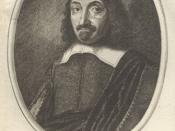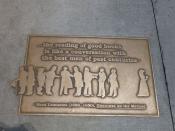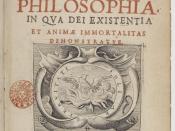The Move from Doubt to Certainty; A Look at the Theories of Descartes and Locke Descartes is interested in the certainty of his existence and the existence of other people and things. Descartes' beliefs vary from those of Socrates. Descartes argues that knowledge is acquired through awareness and experience. Using this approach, Descartes moves through doubt to certainty of his existence. He asks himself various questions about the certainty of his existence and solves them through clear thought and logic. Using this method Descartes establishes doubts to be truths and by the end of the book, he has established that he does indeed exist. In this paper, I will show how Descartes moves through doubt to certainty. I will explain how Descartes uses the cogito, proves the existence of God and what that means to his existence. I will also discuss the general rules of truth that Descartes establishes. In the First Meditation Descartes begins to examine what is certain and what is doubtful.
Descartes wants to establish that his knowledge is certain and not doubtful. He states, ...I had accepted many false opinions as being true, and that what I had based on such insecure principles could only be most doubtful and uncertain; so that I had to undertake seriously once in my life to rid myself of all opinions I had adopted up to then, and to begin, and to begin afresh from the foundations, if I wished to establish something firm and constant in the sciences.(Descartes 95) By this Descartes means that he wishes to establish a foundation for his knowledge based on certainty instead of doubt. Descartes first looks at the senses. This is important because the senses are the first thing to cause doubt. He focuses on the perception of things. He says that things...


